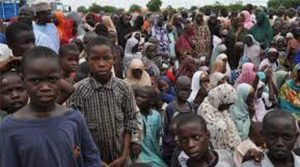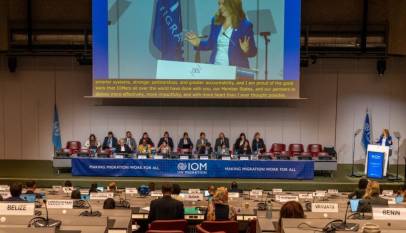EDITORIAL: Why we should all care for Boko Haram IDPs

On daily basis, we continue to hear of Boko Haram, what easily come to our mind are bombings, deaths, and destruction. Beyond that, the insurgency has brought with it Nigeria’s worst humanitarian disaster since the Biafran civil war of the 1960s – the displacement of over 2 million Nigerians, according to Nigeria’s National Emergency Management Agency, NEMA.
At the moment, countless number of Internally Displaced Persons (IDPs) in the northeastern states of Borno, Yobe and Adamawa survive on ideally uneatable wild grasses and fruits like a local grass called Tafasa, while thousands of others will today go to sleep on an empty stomach. Despite the cold and dusty Harmattan wind blowing over northeastern Nigeria today, thousands of these IDPs will have to sleep in an open make-do structure that will neither protect them from the scathing cold that is associated with the weather nor guarantee their personal security.
Yet, it is neither the fault of the over 2 million displaced in northeastern Nigeria nor your fault that they are now displaced; these people, like us, once had means of livelihood and lived a descent life in their various communities. The IDPs, who were mainly farmers, could afford to feed, clothe and shelter themselves before they were forced off their homes with as little as only the clothes they had on.
The more disturbing reality is the fact that a huge percentage of the displaced victims of Boko Haram’s unpardonable campaign of violence are women and children who account for 54% and 55% of the displaced, respectively, according to the International Organisation for Migration (IOM). These women, majority of who have lost their husbands cum breadwinners to the insurgency, now not only have themselves to cater for but their orphaned children as well.
Hunger and starvation among the displaced across the region has led to the deaths of hundreds of children and according to Save the Children, more than 200 children lose their lives every day: to severe acute malnutrition. The desperation and sense of hopelessness among the displaced in the region also meant now many women widows have to trade their bodies to be able to feed their children.
Although we didn’t play any part in getting the over 2 million IDPs in northeastern Nigeria into the lamentable situation they have found themselves today, and although we may not share anything in common with them, beyond our common humanity, we all have a collective moral responsibility to help get them out of their luckless situation.
At the moment, only 38% of the UN’s $0.5 billion appeal for Northeastern Nigeria for 2016 was met and its appeal for 2016/2017 which is $1 billion may risk not been met as well. Yet, we cannot forget the incredible efforts of international donors, NGOs and charities like the UNHCR, UNICEF, Red Cross, MSF, and Save the Children as well as many local charities and individuals for their immense contributions in providing food, shelter and medical care to the 2.2 million displaced in northeastern Nigeria.
However, their collective efforts is far from enough, as such we must all do more and more if we want to avert the looming catastrophe in the over 75,000 children that risk losing their lives to severe acute malnutrition in the coming year. It doesn’t matter if we don’t speak the same language as the almost 2 million displaced women and children; it doesn’t matter if we don’t come from the same geographic location as them; or even if we don’t worship in the same way as they do.
Our little contributions as individuals and organisations could help feed hundreds of displaced elderly people like Baba Makinta in Damaturu’s Malam Matori community, which hosts some of the highest number of IDPs in the region.
Our little contributions as individuals and organisations could help hundreds of mothers in Maiduguri’s Bakassi IDPs camp like Zainabu Ibrahim, who escaped Boko Haram’s den of terror only three months ago feed her 5 children and save her the indignity of engaging in prostitution to feed her children.
Our little contributions could help save the lives of the likes of one-year-old Saliha, whose mother had fled the town of Konduga after her husband was killed by Boko Haram, losing Saliha’s 2-year-old sibling, on her way.
On the basis of our shared humanity, we all are under moral obligation to help save the millions of hapless victims of the Boko Haram insurrection in northeastern Nigeria. We, therefore, must not wait for the government, international donors, and people from far away United States and Europe to come help our brothers and sisters in humanity get out of their pitiful situation.
And we must not think of efforts to save the victims of the unfortunate insurrection that have befallen northeastern Nigeria and deprived its people of their decency, respectability and dignity, as being an exclusive preserve of the Gates and Dangotes. Instead, we must always think of such effort as being a collective one, and see ourselves as individuals with the capacity to influence meaningful positive change in the lives of those families torn apart by the despicable savagery of Boko Haram’s revolt.
We need to know that sacrificing as little our needless luxuries as our expenses on chocolates, and sweets, which we take for granted, could help avert the looming catastrophe in Nigeria’s northeast.
We do hope this serves as clarion-call to all of us to begin to think of ways we could contribute in getting the displaced in northeastern Nigeria out of the quagmire they have found themselves – courtesy of Boko Haram’s indefensible barbarity.
No contribution is too little and no contribution will be too big!












